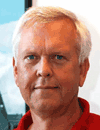|
Session: Using Microarrays to Study Pathogens and Antibiotic Resistance |
| |
09:00 | New Molecular Tests Unveil Antibiotic Resistance
Till Bachmann, Reader, University of Edinburgh, United Kingdom
Today, antibiotic resistance is a worldwide threat with extra costs of 1.5 billion € per year in the EU alone. We developed DNA microarrays and ThermaLight, a novel molecular assay for Extended Spectrum Beta-Lactamases for rapid multiplexed diagnostics and therapy guidance. |
09:30 | Exploring the Global Genomic Landscape of Enteric Pathogens: Genes, INDELs, SNPs-n-Chips
Scott Jackson, Principal Investigator/Molecular Epidemiologist, United States Food and Drug Administration, United States of America
Custom high density microarrays represting ~100 genomes and multiple species of enteric pathogens are utilized in real-time foodborne outbreak investigations as well as microbial bioforensic investigations. |
10:00 | Systematic Analysis of Immune Response Against Varicella Zoster Virus (VZV) using a Self-Assembled Protein Microarray
Colin Campbell, Senior Lecturer, University of Edinburgh, United Kingdom
We have assembled a protein microarray which includes the entire proteome of Varicella Zoster Virus. By screening clinical samples using the VZV array we have identified biomarkers with potential diagnostic of therapeutic value. |
10:30 | Coffee Break and Networking in Exhibition Hall |
|
Session: Novel Microarray Technologies |
| |
11:15 | Polymer Microarrays - Fabrication and Biological Application for Stem Cell Control and Manipulation
Mark Bradley, Professor of Therapeutic Innovation, Precision Healthcare University Research Institute, Queen Mary University of London, United Kingdom
I will demonstrate a variety of approaches for at the preparation and high-content screening of polymer microarray platform and their application in a number of cell based screens. Fabrication methods, including direct inkjet based polymer synthesis and analysis with fixed and live cells on over 10,000 features will be described. A focus on human stem cell control will also be discussed. |
11:45 | Self-Reporting Microarray Platforms that use Molecular Beacon Probes
Salvatore Marras, Assistant Professor, University of Medicine and Dentistry of New Jersey, United States of America
Molecular beacon probes, which generate a fluorescence signal only when they bind to their target, enable the development of self-reporting DNA microarrays. This presentation will show how unlabelled nucleic acids can be detected using arrayed molecular beacons. |
12:15 | Lunch Break and Networking in Exhibition Hall |
13:15 | Poster Viewing Session |
14:00 | Scaling Up the Multiplexed Transcriptional Library for Monitoring Cell Signalling using a Microarray Sensor Platform
Abdullah Gibriel, Assistant Professor in Biochemistry and Molecular Biology, Faculty of Pharmacy, Ahram Canadian University, Egypt
A unique reporter based microarray platform has been designed to monitor changes in transcription factor activity within cells. The sensitivity, robustness and reproducibility of this platform could be used to deconvolute complexity of cell signaling networks and in drug discovery. |
14:30 | Multi Parametric Protein Analysis using Novel Hydrogel Based Microarrays
Thomas Brandstetter, Group Leader, University of Freiburg, Germany
A novel 3D-hydrogel technology consisting of a simple manufacturing and one-step immobilization process for multi parametric, microarray based protein analysis in small sample volumes was developed. Multiplex cytokine assays will illustrate the strength of this approach compared to ELISA tests. |
15:00 | Coffee Break and Networking in Exhibition Hall |
15:30 | Adhesive Microarrays: A New Integrative Solution
Benjamin Corgier, Senior Researcher, Universite Lyon 1, France
The presentation illustrates the "adhesive microarray" approach for biomolecule immobilisation through significant analytical bio assays. The process is highly flexible, provides ease of implementation and produces reliable microarrays of active biomolecules for device assembling and subsequent automated processing. |
16:00 | Surface Tension Confinement Chip for Small Volume Micro- and Nano-Array Applications
Ekaterina Mckenna, Enterprise Fellow, University of Glasgow, United Kingdom
Small sample volume application to bio-arrays is facilitated by surface tension confinement on hydrophilic silicon dioxide chips patterned with a hydrophobic polymer. A concept modular bio-array slide probing kit based on such chips has a wide range of potential applications. |
16:30 | Close of Conference |

